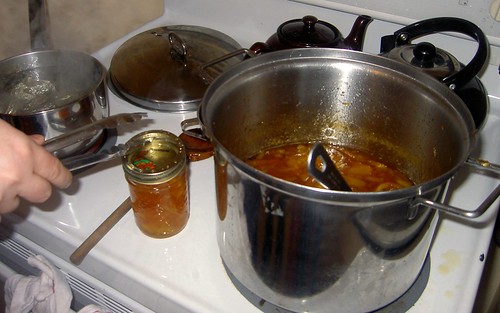
‘Filling jars’
courtesy of ‘FamilyNature’
So, you’ve got your garden under way. Or maybe you’re anxiously awaiting the beginning of your CSA. You’ve armed yourself with a good cookbook or two so you’ll have some basic recipes for that eggplant you inevitably end up with. You wander through your nearest farmer’s market every week, wistfully looking for the first hothouse tomatoes of the season. And then there’s the inevitable result: the moment the Westmoreland Berry Farm strawberries look any good, you buy 8 quarts, get them home, and realize that even if you could fit them all in there, they only keep in the fridge for 3 days, and that there’s no way you can possibly eat that many in that time. Not that this has ever happened to me. I’ve certainly never walked out of a farmer’s market wondering how I managed to buy $90 of fruit and had to hold a sangria party to consume it all… *ahem*
When you can’t foist any more zucchini on your neighbors and coworkers, when you’re tired of pesto, and when you’re embarrassed at the number of peaches you allowed to go bad in your dining room while you were looking for the right cobbler recipe, you realize: You’ve got to find a way to preserve this stuff.
There are basically three methods of preserving fresh produce: Freezing, canning, and dehydrating. And, as I was pleasantly surprised to learn last summer, most of these methods aren’t nearly as complex as you think they are. Time consuming, detail-oriented, certainly. But not complex. And they’re easiest when you have many sets of hands to work with. But you do need some equipment. I recommend banding together with a group of friends who are similarly interested in this stuff, and pooling your equipment, because some of it can take up a lot of space.
Freezing is the easiest, but generally has the shortest duration before you should use up the food. You just need to make sure that you have some sturdy freezer bags, plastic wrap, and reusable plastic containers of the type you can get at any grocery store. If you’re buying large quantities of meat (some farms will sell you half a cow, neatly packaged in plastic and butcher paper bundles), you’ll want a chest freezer. You can get nice half-sized ones that will run quite cheaply and will fit even in small apartments.
Canning gets a bit more complicated. Hot water bath canning can be done in any tall pot that can hold a few jars, as long as you have one of those wire racks to set in the bottom to keep the glass jars off the heat, but having a pressure canner will give you a lot more flexibility in the kinds of things you can preserve. Hot water bath canning works well for high-acid foods and certain kinds of jam recipes, but for low-acid foods, pressure canning is the only safe way to go, and you can do water bath canning in a pressure canner. But if you’ve got friends who are collaborating on your fresh-from-the-dirt produce adventure, there’s no reason for ALL of you to have your own- you’ll likely not all need it at once. But for simplicity’s sake, you should probably all have your own set of canning utensils, a set of tools designed to help you handle hot jars, get food in them, and get them into the canner with a minimum of fuss. A set isn’t expensive and it’ll save you from running around looking for that oddly-shaped funnel every time someone else needs the canner. Finally, but importantly, get a good book about canning; you need precise, tested recipes in order to be able to can food safely. We’ll talk a lot more about canning throughout the season.
Dehydrating is kind of a special case. It can be done in the sun (I’ve heard of people doing it in their car windows), but only in very hot, dry weather, and DC summers are just too humid for that. It can be done in your regular old oven, but that’s energy-inefficient and I don’t recommend doing it often. You can use a food dehydrator, but that takes up a lot of space and may not be worth it unless you’re planning to do a raw food diet. If you’ve got a friend who is especially enthusiastic about making his own jerky and dried apricots, let him borrow your pressure canner in exchange the occasional use of his dehydrator trays.
I know it all sounds overwhelming, but fear not! The first time you open a jar of peaches soaked in bourbon, I promise that you’ll see how worthwhile this all is.




Pingback: Too Much Farmers Market, Too Little Fridge » We Love DC